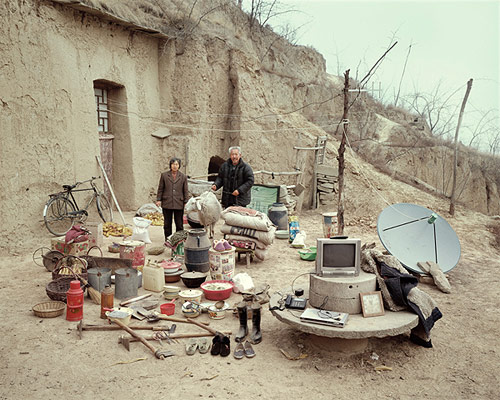There's a book out called "Wave", by Sri Lankan writer Sonali Deraniyagala. When the tsunami struck, on Boxing Day 2004, she lost her husband, her two sons and her parents. "Wave" is her memoir - there's an fascinating review of it here in the New York Times.
The review also has the following quote, from Julian Barnes in Flaubert's Parrot, talking about grief and the attendant feelings and sensations that come with it:
“And you do come out of it, that’s true. After a year, after five. But you don’t come out of it like a train coming out of a tunnel, bursting through the downs into sunshine and that swift, rattling descent to the Channel; you come out of it as a gull comes out of an oil-slick. You are tarred and feathered for life.”
He paints a powerful picture. It's a particularly visceral allegory. So I did a little digging to see what else Barnes has said on the subject - he's a fantastic writer - and scraped together some extracts from a piece he did in The New York Review of Books. It's a long comparison/review of two different books - A Widow's Story, by Joyce Carol Oates, and The Year of Magical Thinking, by Joan Didion. Here's an edit:
In his essay “The Proper Means of Regulating Sorrow,” Dr. Johnson identifies the dreadful uniqueness of grief among the human passions. Ordinary desires, virtuous or vicious, contain within them the theoretical possibility of their satisfaction:
The miser always imagines that there is a certain sum that will fill his heart to the brim; and every ambitious man, like King Pyrrhus, has an acquisition in his thoughts that is to terminate his labours, after which he shall pass the rest of his life in ease or gaity, in repose or devotion.
But grief, or “sorrow,” is different in kind. Even with painful passions—fear, jealousy, anger—nature always suggests to us a solution, and with it an end to that oppressive feeling:
But for sorrow there is no remedy provided by nature; it is often occasioned by accidents irreparable, and dwells upon objects that have lost or changed their existence; it requires what it cannot hope, that the laws of the universe should be repealed; that the dead should return, or the past should be recalled.
Unless we have a religious belief that envisages the total resurrection of the body, we know that we shall never see the lost loved again on terrestrial terms: never see, never talk and listen to, never touch, never hold. In the quarter of a millenium since Johnson described the unparalleled pain of grief, we—we in the secularizing West, at least—have got less good at dealing with death, and therefore with its emotional consequences. Of course, at one level we know that we shall all die; but death has come to be looked upon more as a medical failure than a human norm. It increasingly happens away from the home, in hospital, and is handled by a series of outside specialists—a matter for the professionals. But afterward we, the amateurs, the grief-struck, are left to deal with it—this unique, banal thing—as best we can. And there are now fewer social forms to surround and support the grief-bearer.
Very little is handed down from one generation to the next about what it is like. We are expected to suffer it in comparative silence; being “strong” is the template; wailing and weeping a sign of “giving in to grief,” which is held to be a bad way of “dealing with it.” Of course, there is the love of family and friends to fall back on, but they may know less than we do, and their concerned phrases— "It does get better”; “Two years is what they say”; “You are looking more yourself”—are often based on uncertain authority and general hopefulness. Death sorts people out: both the grief-bearers and those around them. As the survivor’s life is forcibly recalibrated, friendships are often tested; some pass, some fail. Co-grievers may indulge in the phenomenon of competitive mourning: I loved him/her more, and with these tears of mine I prove it. As for the sorrowing relicts—widow, widower, or unwed partner—they can become morbidly sensitive, easily moved to anger by both too much intrusiveness and too much distance-keeping. They may even experience a strange competitiveness of their own: an irrational need to prove (to whom?) that their grief is the larger, the heavier, the purer (than whose?).
A friend of mine, widowed in his sixties, told me, “This is a crappy age for it to happen.” Meaning, I think, that if the catastrophe had happened in his seventies, he could have settled in and waited for death; whereas if it had happened in his fifties, he might have been able to restart his life. But every age is a crappy age for it to happen, and there is no correct answer in that game of would-you-rather. How do you compare the grief of a young parent left with small children to that of an aged person amputated from his or her partner of fifty or sixty years? There is no hierarchy to grief, except in the matter of feeling. Another friend of mine, widowed in a moment after fifty years of marriage—the knot of people by a baggage carousel in the arrivals hall turned out to be surrounding her suddenly dead husband—wrote to me: “Nature is very exact in the matter. It hurts just as much as it is worth.”
Joan Didion had been married to John Gregory Dunne for forty years when he died in mid-sentence while on his second pre-dinner whisky in December 2003. Joyce Carol Oates and Raymond Smith had been together for “forty-seven years and twenty-five days” when Smith, in hospital but apparently recovering well from pneumonia, was swept away by a secondary infection in February 2008. Both literary couples were intensely close yet noncompetitive, often working in the same space and rarely apart: in the case of Didion-Dunne, for a “week or two or three here and there when one of us was doing a piece”; in the case of Oates-Smith, no more than a day or two.
The similarities continue: in each marriage the woman was the star; each of the dead husbands had been a lapsed Catholic; neither wife seems to have imagined in advance her transformation into widow; and each left her husband’s voice on the answering machine for some while after his death. Further, each survivor decided to chronicle her first year of widowhood, and each of their books was completed within those twelve months.
That both Didion and Oates limit their books to the first year of their widowhoods is logical. Long-married couples develop a certain rhythm, gravity, and coloration to the annual cycle, and so those first twelve months of widowhood propose at every turn a terrible choice: between doing the same as last year, only this time by yourself, or deliberately not doing the same as last year, and thereby perhaps feeling even more by yourself. That first year contains many stations of the cross. For instance, learning to return to a silent, empty house. Learning to avoid what Oates calls “sinkholes”—those “places fraught with visceral memory.” Learning how to balance necessary solitude and necessary gregariousness. Learning how to react to friends who mystifyingly decline to mention the name of the lost partner; or colleagues who fail to find the right words, like the “Princeton acquaintance” who greeted Oates “with an air of hearty reproach” and the line, “Writing up a storm, eh, Joyce?” Or like the woman friend who offers her the consolation that grief “is neurological. Eventually the neurons are ‘re-circuited.’ I would think that, if this is so, you could speed up the process by just knowing.”
The intention is kindly; the effect, patronizing. Oh, so it’s just a question of waiting for those neurons to settle? Then there are practical problems: for instance, the garden your husband lovingly tended, but in which you are less interested; you may enjoy the results, but rarely joined him in visits to the garden center. So do you faithfully replicate the same work, or do you unfaithfully let the garden look after itself? Here, Oates finds a wise third way: where Smith planted only annuals, she replants with nothing but perennials, asking the nurseryman for “anything that requires a minimum of work and is guaranteed to survive.”
Which is the problem confronting the widow: how to survive that first year, how to turn into a perennial. This involves surmounting fears and anxieties for which there is no training. Previously, Oates rated as “the most exquisite of intimacies” the ability to occupy the same space as Ray for hours, without the need to speak; now, there is a quite different order of silence. “What I am,” Oates writes, “begins to be revealed now that I am alone. In such revelation is terror.”
Oates excellently conveys the disconnect between the inwardly chaotic self and the outwardly functioning person (and she is functioning again with remarkable rapidity—correcting proofs and working on a story within a week of Smith’s death, back on the literary road within three). She is certainly less in control than she seems to outsiders, but probably more in control than she feels to herself.
Smith's opinions on the relationship between the sexes are somewhat unusual:
To a woman, the quintessential male is unknowable, elusive.
In our marriage it was our practice not to share anything that was upsetting, depressing, demoralizing, tedious—unless it was unavoidable.
Women are inclined to console men, all women, all men, in all circumstances without discretion.
The ideal marriage is of a writer and her/his editor.
A wife must respect her husband’s family even when—as it sometimes happens—her husband does not entirely respect them.
A wife must respect the otherness of her husband—she must accept it, she will never know him fully.
This sounds like shyness raised to marital principle; and it brings with it the danger that when the wife becomes a widow and goes through her husband’s papers, she will find out things she barely suspected. In Ray Smith’s case: a nervous breakdown, a love affair at a sanatarium, a psychiatrist’s description of him as “love-starved,” and further evidence of a difficult, distant relationship with his father. “For all that I knew Ray so well,” she concludes, “I didn’t know hisimagination.” Nor, perhaps, did he know hers, given that he rarely read her fiction. But he was “the first man in my life, the last man, the only man.”
In some ways, autobiographical accounts of grief are unfalsifiable, and therefore unreviewable by any normal criteria. The book is repetitive? So is grief. The book is obsessive? So is grief. The book is at times incoherent? So is grief. Phrases like “Friends have been wonderful inviting me to their homes” are platitudes; but grief is filled with platitudes. The chapter headed “Fury!” begins:
Then suddenly, I am so angry.
I am so very very angry, I am furious.
I am sick with fury, like a wounded animal.
If a creative writing student turned this in as part of a story, the professor might reach for her red pencil; but if that same professor is writing a stream-of-consciousness diary about grief, the paragraph becomes strangely validated. This is how it feels, and what is grief at times but a car crash of cliché?
Grief dislocates both space and time. The grief-struck find themselves in a new geography, where other people’s maps are only ever approximate. Time also ceases to be reliable. C.S. Lewis, in A Grief Observed, describes the effect on him of his wife’s death:
Up till this I always had too little time. Now there is nothing but time. Almost pure time, empty successiveness.
And this unreliability of time adds to the confusion in the sorrower’s mind as to whether grief is a state or a process. This is far from a theoretical matter. It is at the heart of the question: Will it always be like this? Will things get better? Why should they? And if so, how will I tell? Lewis admits that when he started writing his book,
I thought I could describe a state; make a map of sorrow. Sorrow, however, turns out to be not a state but a process. It needs not a map but a history.
Probably, it needs both at the same time. We might try to pin it down by saying that grief is the state and mourning the process; yet to the person enduring one or both, things are rarely clear, and the “process” is one that involves much slipping back into the paralysis of the “state.” There are various markers: the point at which tears—regular, daily tears—stop; the point when the brain returns to normal functioning; the point when possessions are disposed of; the point when memory of the lost one begins to return. But there can be no general rules, nor standard time-scale. Those pesky neurons just can’t be relied upon.
What happens next, when the state and the process are, if by no means complete, at least established and recognizable? What happens to our heart? Again, there are those confident surrounding voices (from “How could he/she ever marry again after living with her/him?” to “They say the happily married tend to remarry quickly, often within six months”). A friend whose long-term lover had died of AIDS told me, “There’s only one upside to this thing: you can do what you fucking well like.” The trouble is that when you are in sorrow, most notions of “what you like” will contain the presence of your lost love and the impossible demand that the laws of the universe be repealed. And so: a hunkering-down, a closing-off, a retreat into the posthumous faithfulness of memory? Raymond Smith didn’t much like Dr. Johnson, finding him too didactic, and preferring the Doctor of Boswell’s account to that of his own writings. But on sorrow, Johnson is not so much didactic as wise, clear, and decisive:
An attempt to preserve life in a state of neutrality and indifference, is unreasonable and vain. If by excluding joy we could shut out grief, the scheme would deserve very serious attention; but since however we may debar our lives from happiness, misery will find its way at many inlets, and the assaults of pain will force our regard, though we may withhold it from the invitations of pleasure, we may surely endeavour to raise life above the middle point of apathy at one time, since it will necessarily sink below it at another.
So what constitutes “success” in mourning? The ability to return to concentration and work; the ability to rediscover interest in life, and take pleasure in it, while recognizing that present pleasure is far from past joy. The ability to hold the lost love successfully in mind, remembering without distorting. The ability to continue living as he or she would have wanted you to do (though this is a tricky area, where the sorrowful can often end up giving themselves a free pass). And then what? Some form of self-sufficiency that avoids neutrality and indifference? Or a new relationship that will either supplant the lost one or, perhaps, draw strength from it?
When Dr. Johnson wrote “The Proper Means of Regulating Sorrow” he was not yet widowed. That event was to occur two years later, when he was forty-three. Twenty-eight years afterward, in a letter to Dr. Thomas Lawrence, whose wife had recently died, Johnson wrote:
He that outlives a wife whom he has long loved, sees himself disjoined from the only mind that has the same hopes, and fears, and interest; from the only companion with whom he has shared much good or evil; and with whom he could set his mind at liberty, to retrace the past or anticipate the future. The continuity of being is lacerated; the settled course of sentiment and action is stopped; and life stands suspended and motionless, till it is driven by external causes into a new channel. But the time of suspense is dreadful.

 Covers an entire SUV. One sleeve at each end.
Covers an entire SUV. One sleeve at each end. 





